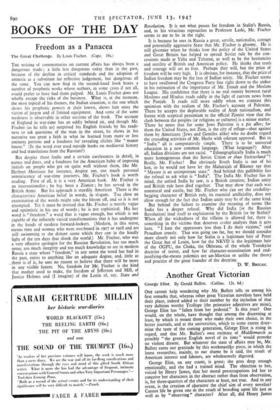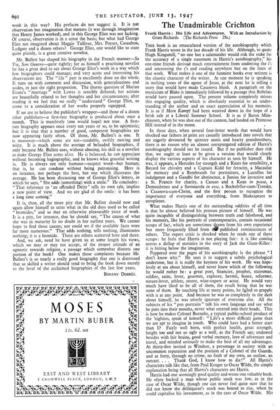Another Great Victorian
George Eliot. By Gerald Bullett. (Collins. 12s. 6d.) ONE cannot help wondering why Mr. Bullett tells us among his first remarks that, whereas other great Victorian novelists have held their place, indeed added to their number by the inclusion of that very dubious worthy Trollope (the pejorative adjectives are mine), George Eliot has " fallen from her pedestal." Is this true? One would, on the whole, have thought that among the discerning at least, by which is meant those who make their own choice, in the better journals, and at the universities, which to some extent deter- mine the taste of the coming generation, George Eliot is rising in regard, and that Mr. Bullett's own estimate of Middlemarch as possibly "the greatest English novel of its time" would provoke no violent dissent. But whatever the state of affairs may be, Mr. Bullett earns our gratitude by this workmanlike piece, in which the latest researches, mainly, to our shame be it said, the result of American interest and labours, are wholesomely digested.
George Eliot, on any count, is great; she goes deep enough emotionally, and she had a trained mind. The objection to her, voiced by Henry James, that her moral preoccupations led her to conceive her characters in the abstract rather than from observation, is, for three-quarters of the characters at least, not true. And in any event, is the creation of character the chief aim of every novelist? Cannot life be given one as the result of brooding upori life just as well as by " observing " character? After all, did Henry James work in this way? His prefaces do not suggest it. It is not observation but imagination that matters (it was through imagination that Henry James worked), and in this George Eliot was not lacking. Of course, observation is in a sense the basis; but what had George Eliot not imagined about Maggie Tulliver, Mrs. Poyser, Casaubon, Lydgate and a dozen others? George Eliot, one would like to state quite plainly, is a great creative novelist.
Mr. Bullett has shaped his biography in the French manner—Sa Vie, Son Oeuvre—quite rightly; for as himself a practising novelist he has a great deal to say about George Eliot's work in a way which few biographers could manage; and very acute and interesting his observations are. The " life " part is excellently done on the whole. It runs on with comment and discussion, with generalisations and asides, in just the right proportion. The thorny question of Marian Evans's " marriage " with Lewes is sensibly debated; her actions are beautifully related to her thoughts and her circumstances; after reading it we feel that we really " understand " George Eliot, so come to a consideration of her works properly equipped.
If we are to believe the publisher's wrapper—and those of a dozen other publishers—a first-tate biography is produced about once a month. This is manifestly (one would hope) not true. A first- rate biography appears once every ten years or so, to be optimistic; but it is true that a number of good, competent biographies are now appearing fairly often. Of these, Mr. Bullett's is one. It is moreover—which some are not—readable, swiftly moving and witty. It is much above the average of belauded biographies, if only because Mr. Bullett uses, without abusing, his skill as a novelist to make George Eliot come alive. He is balanced, he can appreciate without becoming hagiographic, and he knows what graceful writing is. He is always not only humane—suspect word—but human; that is, he can condone without being patronising. Here is an instance, not perhaps the best, but one which illustrates the average. He has been discussing one of George Eliot's letters, in which he says, " She adds (something) with a smile." He concludes : "That reference to ` an offended Deity' tells its own tale, implies a new point of view. And we are glad of the smile : it has been a long time coming."
It is, then, all the more pity that Mr. Bullett should now and again allow himself to utter what in the old days used to be called " bromides," and so mar an otherwise pleasurable piece of work. It is a pity, for instance, that he should say, " The causes of what she was in maturity lie no doubt in her earliest years. We cannot hope to find those causes; nor could we if the available facts were far more numerous." That adds nothing, tells nothing, illuminates nothing; it is a bromide. There are others scattered here and there.
And, we ask, need he have given us at some length his views, which we may or may not accept, of the proper attitude of an agnostic towards religion, a passage which somewhat distorts one portion of the book? One makes these complaints because Mr. Bullett's is so nearly a really good biography that one is distressed that so skilled a writer should tend to bring the book down merely to the level tof the acclaimed biographies of the last few years.
BONAMY DOBRAE.



































 Previous page
Previous page